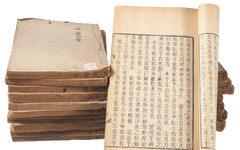
Astragalus (Huang Qi)

Resist sweating and stabilize the exterior
Promote wound healing and tissue regeneration
For Qi deficiency, do not use sparingly
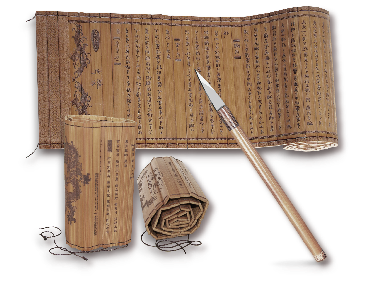
Astragalus, known as Huang Qi in Chinese medicine, is the root of the leguminous plant Mongolian Astragalus. It is harvested in spring and autumn, cleaned of soil and fibrous roots, and sun-dried until it is about 60-70% dry, then bundled and fully dried.

Name: Astragalus
Pinyin: HUANG QI
Alias: Mian Huang Qi
Medicinal Part: Dried root
Properties: Sweet in flavor, slightly warm in nature; enters the Spleen and Lung meridians.
Preparation Methods:
1. Astragalus: Take the raw herb, remove impurities, wash clean, soak, cut into thick slices, and dry. The raw form is good for stabilizing the exterior and stopping sweating, promoting wound healing, and diuresis.
2. Fried Astragalus: Place Astragalus slices in a pan and fry over low heat until deep yellow with slight char marks, then remove and cool. Fried Astragalus is slightly drying, tonifies the Spleen and Qi without causing stagnation, often used for poor appetite and loose stools due to Spleen deficiency.
3. Honey-fried Astragalus: Mix Astragalus slices with an appropriate amount of honey diluted with water, let it sit briefly, then heat in a pan over low heat until deep yellow and not sticky, then cool. Honey-fried Astragalus is moistening, good for tonifying Qi and nourishing blood, often used for Lung deficiency with shortness of breath, Qi deficiency with weak blood, and Qi deficiency constipation.
4. Wine-fried Astragalus: Mix Astragalus slices with rice wine, let sit for 1 hour, then fry. Wine-fried Astragalus has a stronger warming effect, suitable for Qi deficiency with Lung cold and Qi deficiency sinking.
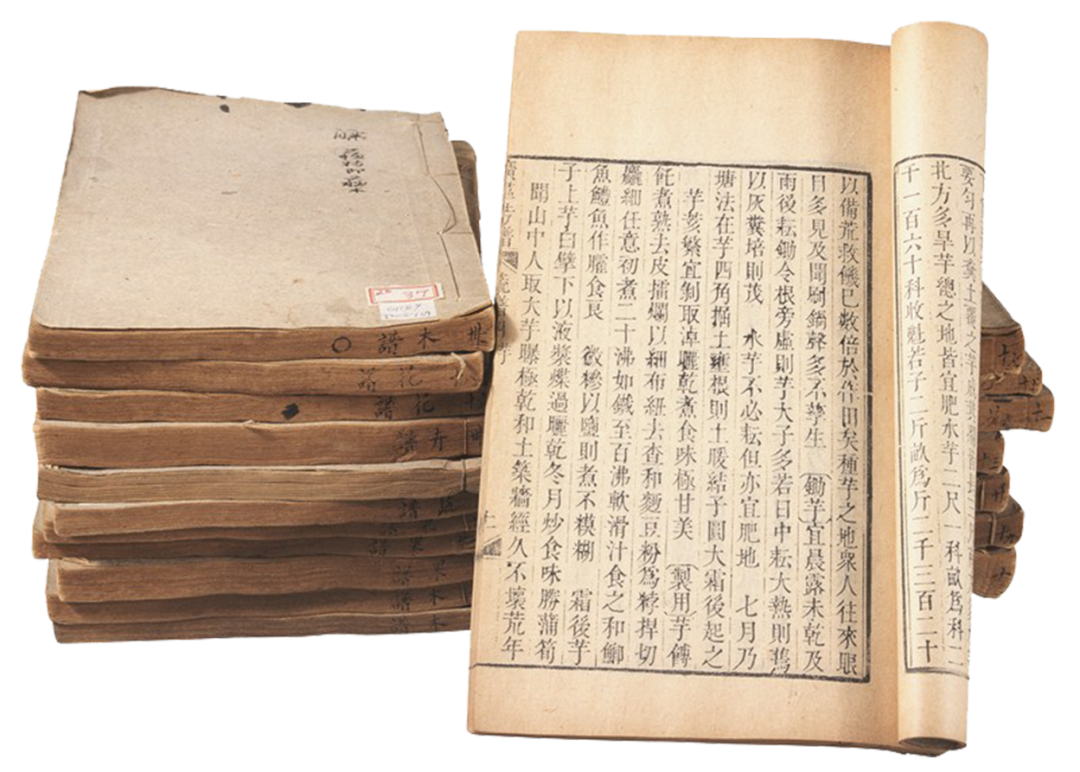
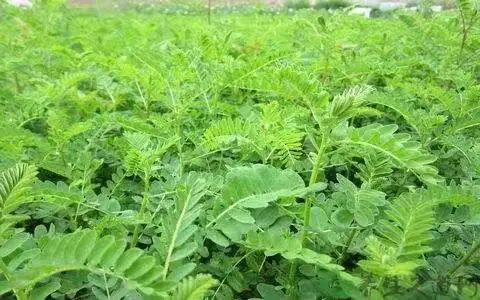
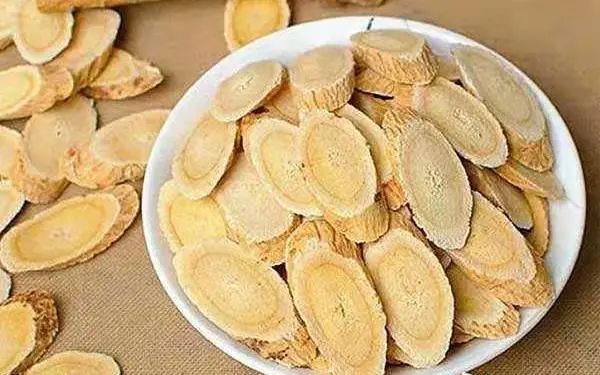
Dosage: Decoction, 9-30g. For tonifying Qi and strengthening the center, honey-fried is preferred; otherwise, the raw form is often used.
Functions and Indications: Strengthens the Spleen, tonifies the center, raises Yang, stabilizes the exterior, promotes diuresis, and aids in wound healing. Used for Spleen Qi deficiency syndrome, Lung Qi deficiency syndrome, spontaneous sweating due to Qi deficiency, Qi and blood deficiency, difficult healing of ulcers, or chronic non-healing wounds.
Related Combinations:
1. For urinary obstruction: Use 6g of Astragalus, add 2 bowls of water, decoct to 1 bowl, and take warm. For children, reduce to half.
2. For jaundice due to alcohol (after drinking, feeling cold, with red, black, and yellow spots on the body): Use 60g of Astragalus and 30g of Magnolia, grind finely. Take a small amount three times a day, washed down with wine.
3. For leukorrhea: Use 15g of salt-fried Astragalus and 30g of Poria, grind finely. Take 3g each time.
4. For atrophic yellow thirst (accompanied by carbuncles): Use 360g of Astragalus, half raw and half steamed with salt water; also use 30g of Licorice, half raw and half charred. Grind both herbs finely. Take 6g each time, twice a day. This formula is called “Huang Qi Liu Yi Decoction.”
5. For constipation in the elderly: Use 15g each of Astragalus and dried tangerine peel, grind finely. Also use 10g of hemp seeds, crush, extract juice with water, decoct until half dry, mix in 1 spoon of honey, and reboil. Add the powdered Astragalus and tangerine peel, mix well and take. Two doses can relieve constipation. Can be taken regularly.
6. For blood lin: Use equal parts of Astragalus and Coptis, grind to powder, and make into pills the size of mung beans. Take 30 pills each time.
7. For less urination: Use equal parts of Astragalus and Ginseng, grind to powder. Also use 4-5 slices of radish, add 30g of honey, slightly charred, and dip in the powdered herbs to eat, washed down with salt water.
8. For hemoptysis: Use 15g of Astragalus and 25g of duckweed, grind to powder. Take 3g each time, washed down with ginger honey water.
9. For coughing up pus and blood, dry throat (this is due to deficiency heat, do not take cold herbs): Use 120g of Astragalus and 30g of Licorice, grind to powder. Take 6g each time, washed down with hot water.
10. For lung abscess: Use 60g of Astragalus, grind finely, and take 6g decocted. Can be taken 3-4 times a day.
11. For paronychia (red flesh protruding at the edge of the toenail): Use 60g of Astragalus and 30g of mushroom, soak in vinegar overnight, add 250g of lard, simmer until reduced to 100g. Strain and apply the fat to the sore three times a day.
12. For fetal movement discomfort (abdominal pain with yellow discharge): Use 30g each of Astragalus and Chuanxiong, 30g of glutinous rice, and 300ml of water, decoct until reduced to 300ml. Take warm.
13. For damp itching: Use wine-fried Astragalus, grind finely, and eat with cooked pig heart, effective.
Precautions: Not suitable for conditions with excess exterior pathogens, internal stagnation, Yin deficiency with Yang excess, or early-stage ulcers with strong heat toxins.
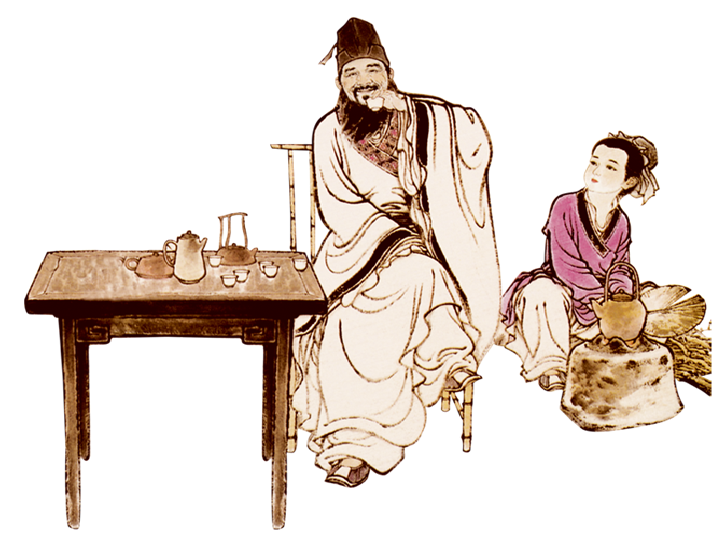 Herb Characteristics
Herb Characteristics
This herb is cylindrical, sometimes branched, with a thicker upper end, measuring 30-90cm in length and 1-3.5cm in diameter. The surface is light brown or light brownish-yellow, with irregular longitudinal wrinkles or grooves. It is hard and tough, not easily broken, with a fibrous and slightly powdery cross-section. The bark is yellow-white, and the wood is light yellow with radial patterns and cracks. The center of old roots may appear decayed, black-brown, or hollow. It has a faint aroma, a slightly sweet taste, and a slight bean-like flavor when chewed.
Related Discussions
1. “Bencao Huiyan”: Tonifies the Lung and strengthens the Spleen, stabilizes the exterior and stops sweating, dispels wind and moves toxins.
2. “Yixue Zhongzhong Canxi Lu”: Can tonify Qi, also can raise Qi, good for treating sinking of the great Qi (i.e., Zong Qi).

Copyright Notice: The text and images published are sourced from the internet. The copyright belongs to the original authors, and we express our deep respect to them. If there are any copyright disputes or other issues, please inform us promptly, and we will delete or handle them appropriately.

